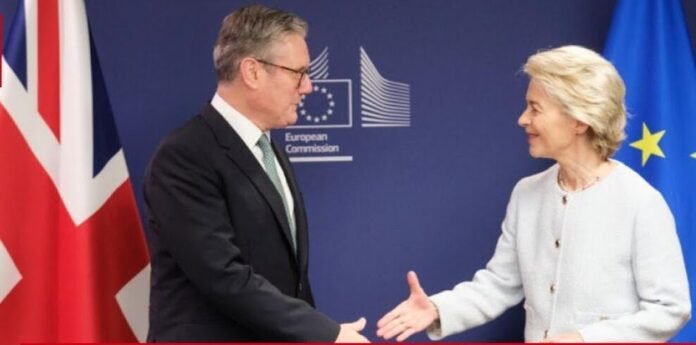UK-EU agree on Gibraltar border rules post-Brexit, avoiding checks while preserving British rule.
The UK has struck a historic deal with the European Union over Gibraltar’s post-Brexit future, settling years of tense negotiations on the territory’s disputed border with Spain.
Foreign Secretary David Lammy announced the breakthrough after meeting Gibraltar’s Chief Minister Fabian Picardo and travelling to Brussels for final talks with EU and Spanish officials. The agreement removes the threat of border chaos and preserves British sovereignty over the tiny but strategically vital overseas territory.
Under the deal, there will be no routine checks on people or goods crossing the Gibraltar-Spain border. Instead, joint passport controls will be conducted at Gibraltar Airport by both Gibraltar and Spanish officials, allowing travellers to move seamlessly into Spain’s Schengen free-travel zone. British arrivals can continue their journey into Spain without further checks, mirroring the system used at London’s St Pancras for Eurostar passengers.
Lammy praised the deal as a “practical solution” that protects Gibraltar’s economy and British sovereignty. “This government inherited a situation from the last government, which put Gibraltar’s economy and way of life under threat,” he said. “Today, we have delivered security and certainty.”
Chief Minister Picardo, who has led Gibraltar’s negotiations throughout the Brexit process, hailed the deal as safeguarding future generations. “I have worked hand in glove with the UK government throughout this negotiation to deliver the deal Gibraltar wants and needs – one that will protect future generations of British Gibraltarians and does not in any way affect our British sovereignty.”
The agreement received a warm reception in both London and Madrid. Prime Minister Sir Keir Starmer spoke with Spanish Prime Minister Pedro Sánchez by phone on Wednesday evening, with both leaders agreeing the deal unlocks “significant opportunities to strengthen UK-Spain relations.” Starmer also called Picardo to congratulate him and thank him for his years of dedication.
Gibraltar, a rocky outcrop on Spain’s southern coast, has been under British control since 1713. Spain continues to claim sovereignty, but Gibraltar’s population of 32,000 remains fiercely loyal to the UK. In a 2002 referendum, nearly 99% rejected any plan to share sovereignty with Spain.
Around 15,000 people cross the Gibraltar-Spain border daily for work and leisure. Until now, Gibraltar residents have used residence cards to cross without passport stamps, while Spanish citizens have used government ID cards. But with the EU preparing to introduce its new Entry/Exit System later this year, many feared looming delays and disruption.
The UK said all sides agreed that the final treaty would not undermine British sovereignty or affect the UK military’s operational control. Gibraltar’s airport, run by the Ministry of Defence, hosts an RAF base that will remain fully under British command.
The agreement still faces political opposition. Reform UK condemned the deal, with deputy leader Richard Tice accusing Labour of surrendering Britain’s interests. “Once again, this Labour government have shown utter disregard for our overseas territories. This is another surrender,” he declared.
Conservative shadow foreign secretary Priti Patel warned her party would scrutinise the legal text closely. “The Conservative Party in government, and now in opposition, has always been clear that any deal must ensure that the sovereignty and rights of Gibraltar are safeguarded in full,” she said, adding that Labour’s record on territorial integrity demanded close examination of the details.
Liberal Democrat foreign affairs spokesman Calum Miller offered cautious support, saying the deal brought the UK “one step closer to a proper trade deal with the EU.” However, he insisted Parliament must be allowed full scrutiny.
Spanish Foreign Affairs Minister José Manuel Albares and EU trade chief Maros Sefcovic both celebrated the deal as “historic.” Sefcovic described it as opening “a new chapter” in UK-EU relations.
All sides have committed to finalising the treaty text as quickly as possible, though the precise timeline remains unclear
